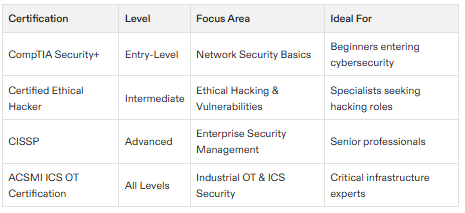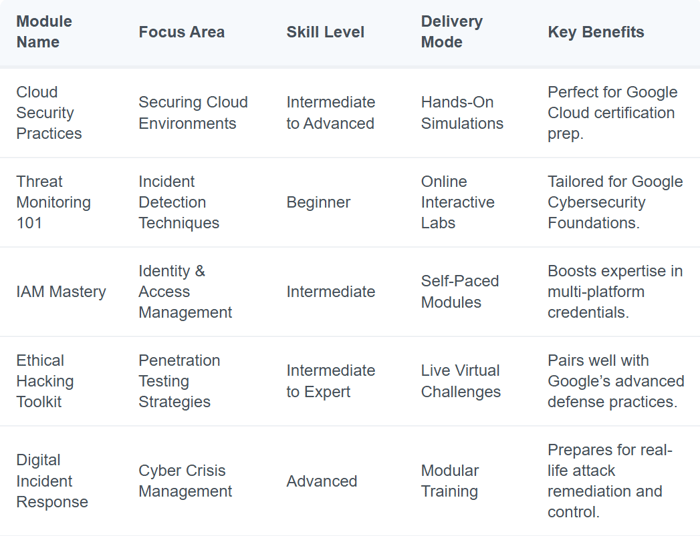Table of Contents
Cyber threats are becoming more sophisticated, forcing organizations to constantly seek out experts who can defend against malicious attacks. This growing demand makes certifications a vital asset in proving your skills and earning trust in the field. A cybersecurity certification guide helps you understand the best pathways to build and validate your expertise. Certifications not only sharpen your technical know-how but also set you apart in a competitive job market.
Why Pursue Cybersecurity Certifications?
The benefits of earning a cybersecurity certification guide are immense, and investing in one helps fast-track your career. Here’s why certifications matter for professionals in this field.
1. Proof of Expertise
Certifications like CISSP, CEH, or ACSMI ICS OT Cybersecurity Certifications validate your knowledge and demonstrate to potential employers that you’re well-versed in specific areas of cybersecurity.
2. Better Career Opportunities
Demand for certified professionals is at an all-time high. Employers often prefer candidates with industry-recognized certifications to ensure they’ve undergone relevant training. Positions like ethical hacker, security analyst, and operational technology (OT) defender practically demand certified credentials.
3. Higher Earning Potential
Certified professionals make significantly more than their non-certified counterparts. According to industry studies, certifications such as CISSP or CISM can boost your salary by up to 22%.
4. Enhanced Credibility
Getting certified makes you a credible authority within your specialty. Imagine being able to confidently troubleshoot cyberattacks or secure vulnerable industrial control systems—this becomes your professional identity.
5. Global Recognition
Top cybersecurity certifications are universally acknowledged, allowing you to work across industries anywhere in the world. Certifications like those offered via ACSMI help professionals gain credibility and recognition internationally.
How to Choose the Right Certification
The key to selecting the right certification lies in aligning it with your career aspirations. This cybersecurity certification guide breaks certifications down by skill level and career path.
Entry-Level Certifications
For beginners, certifications provide an introduction to cybersecurity fundamentals. Start with programs like CompTIA Security+ or CySA+, focusing on network basics, compliance, and incident response skills.
Intermediate Certifications
Specialists looking to upskill should aim for certifications like Certified Ethical Hacker (CEH) which emphasize risk assessment, penetration testing, and exploiting vulnerabilities. You’ll also find ACSMI's free module previews helpful for advancing to OT and ICS security domains.
Advanced Certifications
Senior professionals should explore higher-tier options, such as CISSP or ACSMI's ICS OT Certification (full course). Covering advanced cryptography, system design, and industrial security, these certifications address enterprise-scale applications.
Industry-Specific Focus
Unsure where your interests lie? Pick certifications matching your target industry. For example, someone working in manufacturing might pursue OT certifications, while a person in finance could prioritize certifications in data encryption and access control.
Recommended Top Cybersecurity Certifications
Here’s a closer look at certifications frequently recommended in every cybersecurity certification guide.
- CompTIA Security+: A starting point for anyone entering cybersecurity.
- Certified Information Systems Security Professional (CISSP): One of the most recognized certifications globally for advanced security management.
- Certified Ethical Hacker (CEH): Learn the art of hacking ethically.
- Certified Information Security Manager (CISM): For professionals aiming for management positions.
- ACSMI ICS OT Cybersecurity Certification: Specialized in industrial and operational technology cybersecurity.
ACSMI ICS OT Cybersecurity Certification – The Ace in the Industry
This guide wouldn’t be complete without mentioning the ACSMI ICS OT Cybersecurity Certification, an industry leader with over 400 modules tailored toward niche cybersecurity skills.
ACSMI’s curriculum focuses on OT and ICS security—high-demand areas requiring expertise in manufacturing, critical infrastructure, and utilities. Components like live simulations, threat modeling exercises, and a deep-dive into ICS vulnerabilities make it a standout program.
How to Prepare for Your cybersecurity certification guide
Proper preparation is the key to earning your certification with confidence. Here’s how to set yourself up for success:
Understand the Exam Requirements
Start by thoroughly reviewing the exam objectives and prerequisites. Knowing what topics will be covered ensures you allocate time to master all required skills.Opt for Self-Paced Learning
Busy schedule? No problem. Many programs, like ACSMI, offer flexible learning options, allowing you to progress at a pace that suits your commitments. Self-paced learning also lets you revisit challenging concepts as needed.Focus on Hands-On Practice
Cybersecurity is as practical as it is theoretical. Make sure you engage with programs that include interactive labs and real-world simulations. This experience is crucial for developing the troubleshooting skills needed in the field.Join Study Groups
Learning alongside others can be highly motivating. Study groups provide a platform for discussing complex topics, sharing resources, and gaining fresh perspectives. Whether in-person or online, collaboration is invaluable.Take Practice Exams
Mock tests are your best friend when preparing for any certification. Use them to gauge your readiness, identify weak areas, and refine your test-taking strategies. Practicing under time constraints will also boost your confidence on exam day.
By incorporating these steps into your preparation plan, you'll not only master the material but also approach your certification exam with clarity and confidence.
Certification Comparison Table
For a quick reference, here’s a breakdown of popular certifications, including ACSMI’s 400+ module program.
FAQ
1. What is the best certification for beginners in cybersecurity?
CompTIA Security+ and Cisco’s CCNA Cyber Ops are popular introductory options. For a niche focus, ACSMI offers free modules to familiarize learners with OT-specific essentials.
2. Are cybersecurity certifications mandatory for a job?
Many employers list certifications as preferred or mandatory prerequisites, especially for advanced roles. Certifications like CISSP or ACSMI ICS OT carry significant weight in recruitment.
3. How long does it take to get certified?
The duration varies. Entry-level certifications often take 1-3 months, while advanced certifications like CISSP might require 6-12 months of preparation.
4. What is the cost of a cybersecurity certification?
Entry-level certifications range from $300–$500, whereas advanced ones like CISSP can cost around $1000 or more. ACSMI provides various plans to suit different learning needs, with free modules for an affordable start.
5. Is hands-on experience necessary for certification?
Yes. Hands-on labs and simulations set you apart, equipping you to handle real-world challenges effectively. Programs like ACSMI emphasize interactive learning to help learners bridge theory and practice.
Final Thoughts
This cybersecurity certification guide highlights that becoming certified is not just about passing exams but equipping yourself with skills relevant to the real world. Certifications arm you with credibility and competence to stand out in an increasingly competitive industry.
Whether you’re taking a self-paced course or exploring modules like those offered by ACSMI ICS OT Cybersecurity Certification, remember that consistent effort and the right program can fast-track your cybersecurity career. Begin today—and unlock endless opportunities in an exciting domain!





